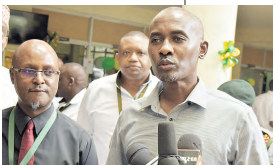

Garissa chief magistrate Thomas Mwangi has expressed concern that cases to do with female genital mutilation do not get to court, despite the practice still being practised.
Speaking during a public engagement forum with stakeholders and members of the public, Mwangi said the victims fail to get justice as cases go unreported.
“We know that FGM is a problem here. It is still rampant, it is a problem. But the interesting thing is that not many of them end up in court because there is no complainant,” he said.
Unicef data shows that the practice is more prevalent during adolescence, the majority of cases taking place before the age of 10 years.
Four million girls and women in Kenya have undergone the vice, with Garissa among 22 counties with the highest prevalence of FGM.
The Somali community leads at 98 per cent, followed by the Samburu at 94 per cent. The chief magistrate noted that cultural norms play a role in the outcomes of FGM cases.
“Victims do not have a chance to express themselves because of the culture. The victims seem helpless and as of now, in my view, do not have sufficient forums to express themselves.”
While making a case for alternative dispute resolution, Mwangi said these mechanisms should only be applied in cases that are not criminal in nature.
“The constitution has provided for other ways to resolve disputes without going through court proceedings which include ADR. We bring in elders, arbitrators or other parties who volunteer to mediate disputes to help in settling the cases out of court,” he said.
“However, we cannot recommend cases such as those involving FGM, sexual off enses, robbery with violence and other criminal cases to be resolved using alternative justice systems but for other cases, as long as all the parties have agreed to use those mechanisms, because the courts can not force them to lodge the cases with them.”
ADR mechanisms help the courts
in clearing case backlog and include
employing reconciliation, mediation, arbitration, traditional and
religious methods such as Maslah
for the Islamic community.
In most cases ADR provides a winwin outcome, the chief magistrate
said, since the parties agree with the
resolutions, unlike court decisions.





![[PHOTOS] Gachagua warm reception in Nyandarua](/_next/image?url=https%3A%2F%2Fcdn.radioafrica.digital%2Fimage%2F2025%2F04%2Fc2a8c64d-5577-4768-a0ac-513c8876c288.jpeg&w=3840&q=100)





